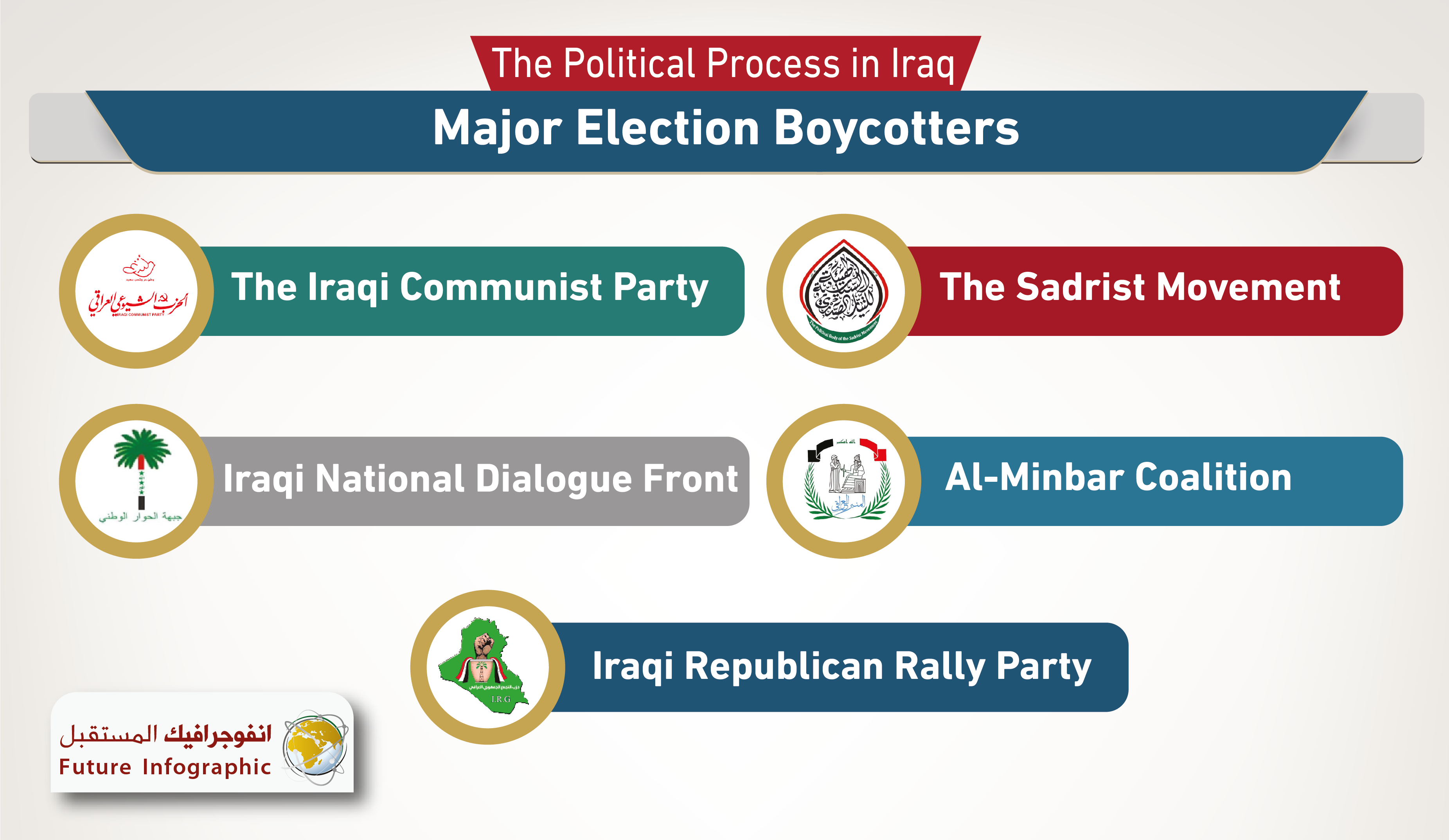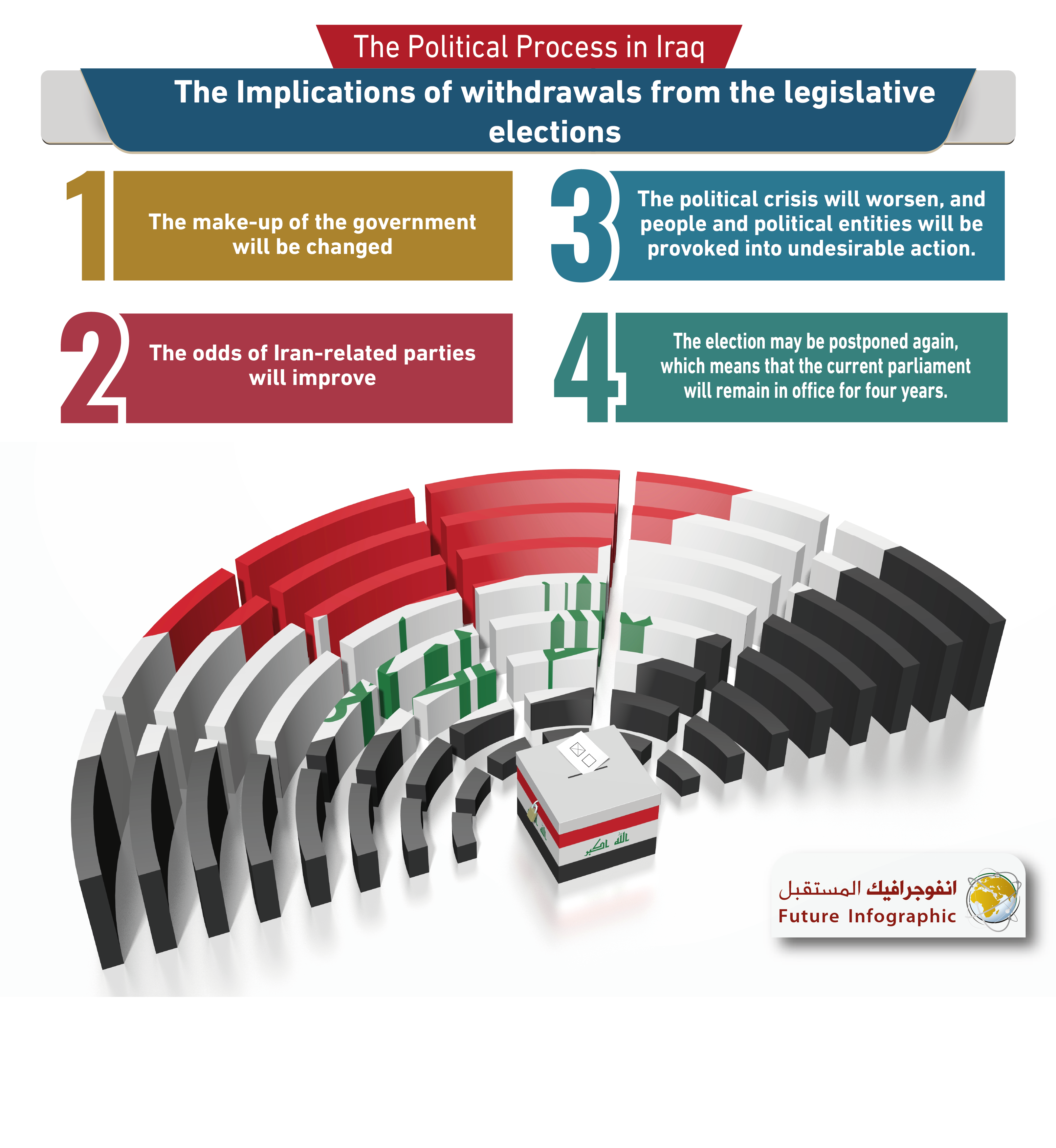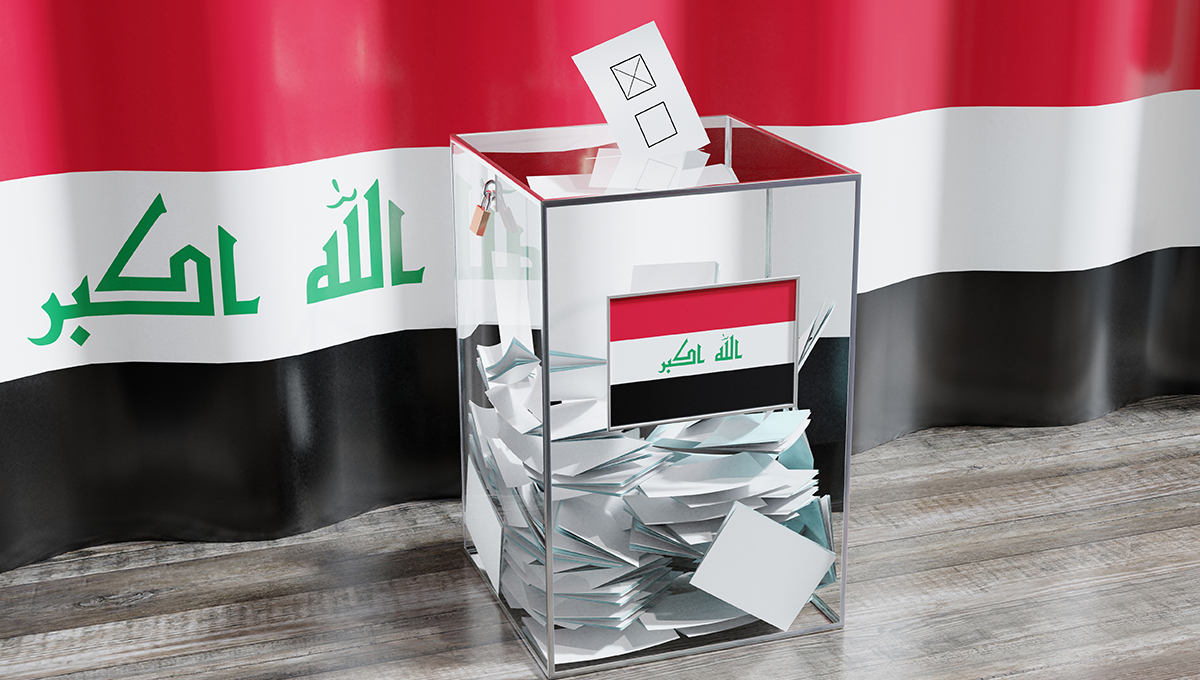The political scene in Iraq is gaining special importance with the approach of the early legislative election which is to be held on October 10, 2021, amid several crises on the public services, political, economic, and security level. The situation is worsened by the fact that the Iraqi government can no longer put restrictions on people buying arms, let alone the prevalence of corruption in many sectors. These long-standing problems have all contributed to stirring popular discontent, which, in turn, has urged Iraqis to take action.
However, Iraq is witnessing the return of the phenomenon of boycotting elections. Many political entities and parties resorted to election boycott last July. This complicates the political situation in Iraq, as many political figures decided to withdraw from the current political scene, the first of whom was the religious leader and head of the Sadrist movement Muqtada al-Sadr, who was soon followed by various forces and parties from all walks of political life.
Past Boycott Experiences
Needless to say, election boycott is not new to the Iraqi political scene. Since 2003, Iraqi elections have been boycotted, both by voters and by potential candidates, for various reasons. This tactic is still adopted, though it has always proven futile. Election boycott in Iraq rarely, if ever, had the desired effect; instead of serving the boycotters' purposes, it was always in their opponents' favour.
The first election boycott in Iraq was in 2004-2005. It was embraced by many political and religious entities, such as the Association of Muslim Scholars, Al-Khalisi Movement, the office of Ayatollah Qasim Al-Ta'i, in addition to a number of Sunni entities and groups (this led to the marginalization of Sunni Muslims in Iraqi political life later). Boycotters back then said that Iraq has to be freed of US occupation first, or else the elections will not be legitimate.
In 2010, Iraqi National Dialogue Front boycotted the legislative elections because the Front's leader was forbidden to take part in it.
In 2014, the Sadrist Movement announced that its members will not be part of Iraqi political life anymore. In 2018, huge numbers of Iraqi citizens decided not to vote, believing that taking part in the political process would bring back corrupt officials to authority.
It is well known that the Sadrist Movement decided to quit politics many times in the last few years, only to come back, and so on.
The 2021 Election: Who are the Boycotters this Time?
The first of the boycotters this time is Muqtada al- Sadr, who delivered a speech on July 15, in which he said that he was going to withdraw from political life, boycott the elections and cut ties with all current and former government officials. He also said that everyone is held accountable for what is happening in Iraq, and that his decision was taken with the aim of saving and protecting what is left of a corruption-ridden Iraq. Al-Sadr dissolved the political office of the movement. Consequently, his supporters, such as first deputy speaker Hasan al-Kaabi, Hakim Al Zamili and Maha al-Dori, decided not to take part in the elections.
The second boycotter was the Iraqi Communist Party, which also urged its supporters to refrain from voting. Reda al- Zahir, member of the party's central committee, said that the party decided to boycott the election on account of the political crisis in Iraq, and the lack of security. Other boycotters followed soon, including al-Minbar Coalition, led by former prime minister Ayad Allawi, National Dialogue Front led by former deputy prime minister Saleh al-Mutlaq, the Iraqi Republican Rally Party led by Saad Asem Aljanabi, among other political parties and entities.

The Tactic of Withdrawal
Though the Iraqi political forces and entities gave various justifications for the boycott, all of them agreed that the main reason is the lack of the security required for holding the election, especially with the government's inability to control arms possession, the practice of bribing voters, and their belief that the election will not result in any real change. The justifications varied according to the orientations of the various political entities.
For example, Al-Sadr said that corruption and injustice in Iraq is too prevalent to combat or even reduce, as all forces are only interested in money, power, or arms, and nobody is working for Iraq's good, so the best thing to do is not to be part of that scene.
As for the leaders of the Communist Party, they pointed out that the social and political atmosphere is by no means healthy or suitable for holding elections, as everyone has access to weapons, and bribes are the name of the game. Therefore, holding elections at the present time will not bear fruit. Raid Fahmi, the party's general secretary, said the election will not bring about any hint of a change, and will be actually of catastrophic consequences to Iraq and its citizens.
Al- Minbar bloc said in a statement that there is no hope of holding fair elections in the light of the worsening situation and the deteriorating living conditions, let alone the fact that weapons are always available, activists are assassinated, and the state still oppresses opponents.
The National Dialogue Front said that the decision to hold early elections is obviously unwise, given the lack of security and the unrestricted availability of weapons. The present circumstances make it highly unlikely that such elections will be fair, as electoral fraud is not difficult when anyone can have access to guns and weapons, and when money is always there to tilt the balance of power in favour of a certain candidate. The Republican Rally Party has similar reasons for boycotting the elections; its leaders referred to the lack of the secure, fair and democratic environment necessary for holding 'real' elections. Money is incessantly used to buy votes; militias have the upper hand and the state no longer has any prestige or ability to put an end to chaos.
These, however, do not seem to be the real reasons for boycotting the election. The Sadrist Movement, for instance, faced much pressure; Sadrist ministers were constantly criticized for failing to run public service ministries (e.g. health, energy, finance, etc.) efficiently. Besides, the movement had previously announced that the next Iraqi prime minister will be a Sadrist, and promised supporters to win 100 parliamentary seats in the upcoming election, but soon the movement's leaders realized that this was easier said than done, especially as many officials affiliated with the movement were accused of corruption. These circumstances led the movement leaders to take the sudden boycott decision after the huge campaign and all the other preparations they made for this election. These preparations, however, can stimulate the movement's supporters to elect its candidates in case Al-Sadr decides to undo the boycott decision. Some see the boycott decision as a mere political maneuver typical of Sadrists, who would give up their decision once they achieve their goals.
As for the other political forces, they are no longer influential as far as political life is concerned. This particularly applies to the Communist Party, the National Dialogue Front, and the Republican Rally Party. Therefore, their decision to withdraw their candidates is just a cover for their inability to compete, and a move that may bring them some support from the Iraqi citizens who, discontented as they are, would be happy to see politicians showing some sympathy and support. Besides, running for this election may reveal how limited the popularity of these forces are, and so it may mean their end.
Proceeding with the Electoral Process
Apart from the boycotters, it is important to have a look at the approaches of various influential institutions and forces towards the upcoming election. These can be summed up as follows:
1. The legal and institutional stance:
This stance is represented by the Iraqi electoral commission, which, on July 26, announced that all electoral procedures and measures will be completed, and that ballot papers will include the names of all the candidates, no matter whether they withdrew or not. The commission pointed out that according to electoral rules, the candidates should have withdrawn before June 20. Accordingly, their withdrawal now is illegal and pointless.
The commission's spokesperson Jumana Al-Ghalay said that 3249 candidates will run for this election, none of whom submitted an official request to the commission with the aim of withdrawing. This means, she said, that all of these candidates are officially taking part in the election.
2. The political position:
President Barham Salih, Prime Minister Mustafa al-Kadhimy and Parliament Speaker Mohamed al-Halbousi called on Muqtada al-Sadr to take part in the election. On July 31, President Salih said that the election will be held as scheduled, and that the Iraqi government will see to it that electoral fraud be prevented so that the election's results should be a genuine reflection of the citizens' political will.
Meanwhile, the blocs led by former Prime Ministers Nouri al –Maliki and Haider al-Abadi, the State of Law and Victory Alliance respectively, are critical of the boycotters' attitude, stressing the importance of participation. Rahim al –Aboudi, the Wisdom Movement candidate, said that most blocs believe that this election must be held, and the electoral commission already made all the required legal and official preparations. Parliament member Jasim al-Bakhati said that the forces and parties that withdrew did so because they are not sure of their ability to compete and win the election, and that their declared reasons for the withdrawal are only political propaganda meant to bring them popularity. KDP parliament member Shirwan al-Dubrdani said that the elections will be held as scheduled, and some of the boycotters will retreat from their decision later. Hamid al-Mutlaq, leader of the Dialogue and Change Party, said that these repeated withdrawals will not have any effect on the elections, which will be held as decided.
The Implications of the Withdrawals
It is unwise to think that the withdrawals will not influence the Iraqi political scene, which is already complicated. Even if we choose to think that some political forces are not weighty enough to change the situation, we must realize that the Sadrist Movement is an exception, as it is one of the most influential political forces in Iraq. This was particularly manifest in the 2018 election, where Sadrists won most of the parliament seats, not to mention the huge number of supporters the movement has, and the Sadr militia that can surely have a say as far as security is concerned.
The withdrawals will change the make-up of the government, especially as many of the participating parties, which are on good terms with Iran, have better chances now that the Sadrists are out. Besides, the withdrawals can aggravate the political crisis in Iraq, which can, in turn, provoke people and politicians into taking actions that can hinder the government and prevent it from dealing efficiently with urgent issues. Last but not least, on account of these withdrawals, it is highly likely that the election may be postponed again (this is already whispered in various political circles). This means that the popular demand of holding early elections with the aim of getting rid of the effects of the 2018 election did not bear fruit, as postponing the election again would mean that the current parliament will remain in office for four years.

In conclusion, it is possible that the political figures and entities that withdrew will retreat from their decision, and if this happens, it will not be the first time. This particularly applies to the Sadrist Movement and the National Dialogue Front. Besides, attempts to boycott previous elections (in 2003) proved that none but the boycotters are affected by such a decision, as the elections usually go on as scheduled. Finally, we must not forget the high cost that Sunni parties and movements had to pay when they made a decision to boycott the elections a few years ago.


